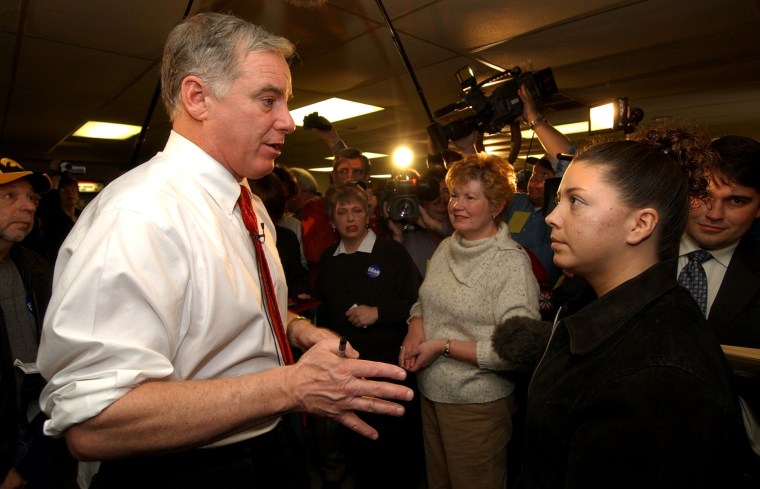Howard Dean is not the perfect candidate.
He is, as he concedes, learning on the job and like any student he has made his fair share of mistakes. Over the past four months, the former Vermont governor has been in hot water for comments suggesting he wants to appeal to Southerners who drive pickup trucks with Confederate flag decals. He has had to back away from the implication that his brother was in the military and more recently from a statement implying that he is neutral on the matter of Osama bin Laden’s guilt for allegedly masterminding the Sept. 11 terrorist attacks.
And those are but three examples of the missteps and gaffes that his opponents argue make Dean unelectable. The Kerry campaign distributes a daily newsletter in which it aims to correct and inspect Dean’s statements and Rep. Richard Gephardt recently alleged that Dean has a "pattern" of saying "something indefensible."
If you buy into their reasoning, Dean’s mistakes are indicative of his inexperience, and as both men, and some of Dean’s other opponents are quick to point out, inexperience doesn’t lead to the White House.
Not as simple as that
But the issue isn’t as simple as that. While inexperience is a potential factor in Dean’s missteps, he arguably has a solid grasp of the issues and, more importantly, hasn’t been caught of guard by difficult questions. Rather, it is the mundane that has presented a trap, the sort of questions where a simple answer is sufficient but the lure to embellish or talk impulsively is great.
Consider the question that led to Dean’s comments about bin Laden. As reported by the Concord Monitor, Dean was asked, "Wouldn't most Americans feel strongly that bin Laden should be tried in America — and put to death?" The simple, and by every measure, correct answer, is yes. Surveys show that an overwhelming number of Americans share that position. Indeed, so do President Bush and Dean’s rivals for the nomination.
Even Dean has long maintained that bin Laden is guilty, saying as much both before and after his Monitor interview was published. So why did he initially offer an answer that reads in part, "I still have this old-fashioned notion that even with people like Osama, who is very likely to be found guilty, we should do our best … in positions of executive power, not to prejudge jury trials."
Another theory
Some observers argue that Dean simply doesn’t listen or sufficiently think before speaking, but that theory only tells part of the story. Yes, Dean does speak off the cuff and he admits "the rules are a little different with the national press corps than they are in the local press corps and you need to be a little more careful and I think I am trying to be a little more careful about my off-the-cuff remarks." Moreover, Dean has begun to add caveats to his categorical statements, going out of his way to add qualifiers like "major candidates" or "almost all" to some of them.
And yet, Dean still finds trouble. Part of that is his nature. Says Dean, “I am somewhat of a street-fighter. If someone punches me, I am apt to chase them down and I need to be restrained by the people who know better and have been in the game longer than I have." But could Dean also be over-thinking or perhaps under-thinking the questions he gets? Is it possible that he still hasn’t adjusted to the national stage and the rigors associated with a presidential candidacy?
Not according to Dean. For him, "it has nothing to do with running for president. It has to do with the kind of person I am. I tend to say what I think and that includes all of what I think. Not just the part that’s good for focus groups."
Dean adds, "What people are likely to hear from me are two things. The first is you are likely to hear all of what I think and not just some of what I think. And the second is that I sometimes speak elliptically and so I leave out pieces that seem to me to be obvious but that aren’t obvious to the people who haven’t heard me talk about whatever the subject is before."
Blaming the journalists
Yet, even this is unsatisfactory. It’s simply misleading to convey the impression that a family member served in the military when they plainly didn’t and it isn’t elliptical to speak of appealing to Confederate-flag-toting pick-up truck drivers. Moreover, to blame gotcha journalism as Dean does when he says, "I hate to be totally blunt about this but I still need to get used to the gotcha style of politics here," seems to be avoiding reality. The reality is, as most campaign watchers will tell you, that Dean needs to learn to be more disciplined.
In that regard, it might be helpful for Dean to watch the following scene from “The West Wing.” Facing the prospect of an uncomfortable and probing question, the fictional White House press secretary is instructed by her colleagues to say as little as possible. By way of training, they ask her if she knows what time it is. She looks at her watch and answers by giving the exact time. Her colleagues repeat the question and she again gives the time, whereupon it is pointed out to her that the answer to the question "Do you know what time it is?" is a simple "Yes."
